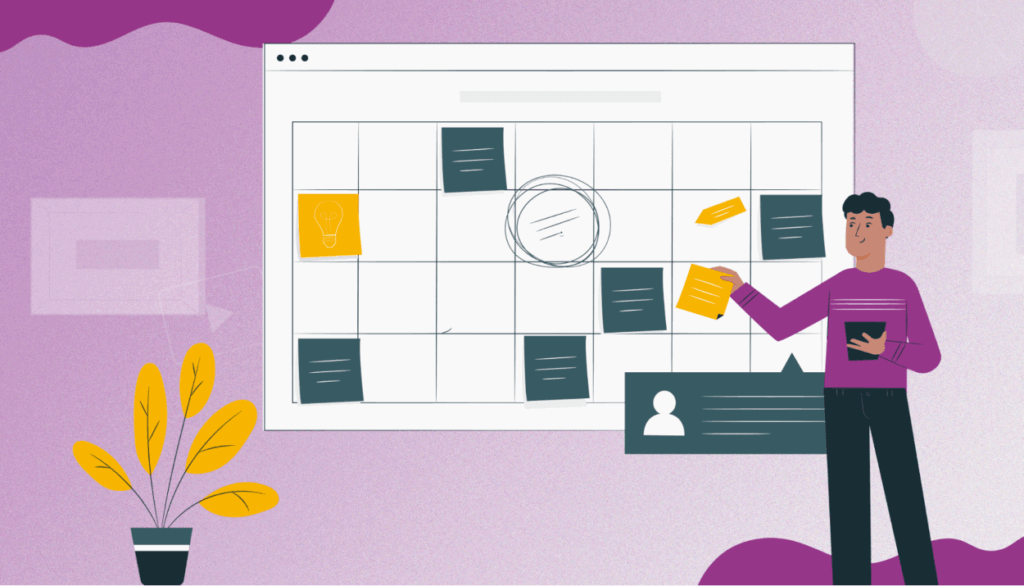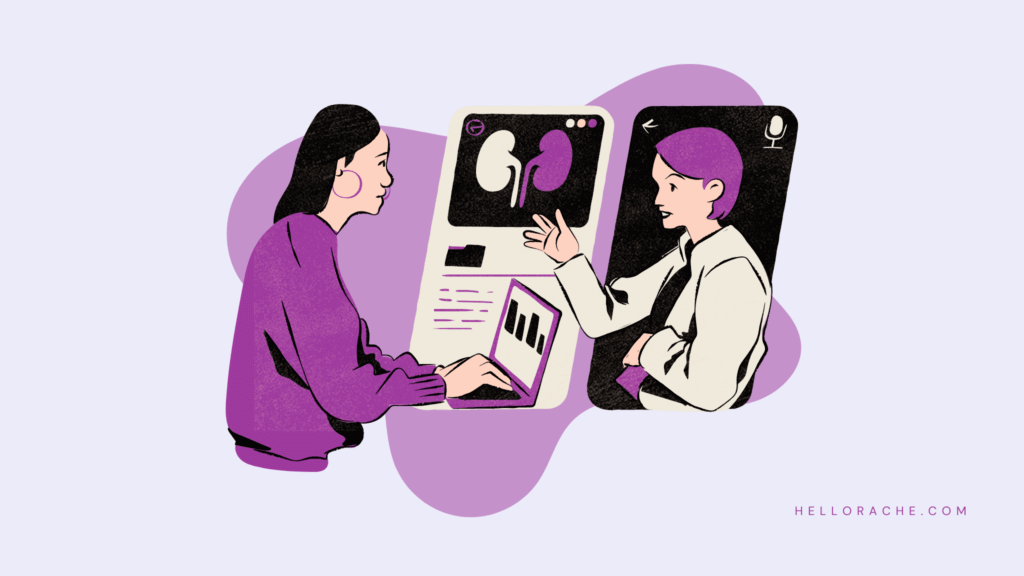Every healthcare clinic needs to keep a clear appointment schedule. Knowing when your patients are coming and who is treating them is essential to your success.
Appointment setters can help with all of your scheduling needs. They take appointments and make sure they match each healthcare professional's availability.
Whether it's scheduling online, over the phone, or in-person, it's all part of the appointment setter's job description.
Hiring a new employee is a big commitment. To help you decide whether an appointment setter is right for your clinic, we've put together the following guide.
We'll tell you about what they do and the average appointment setter's salary. Plus, we'll tell you why a Healthcare Virtual Assistant (HVA) could be the right solution.
What is an appointment setter?
Appointment setters work in a range of industries, including health insurance, healthcare, and sales.
They often work in medical clinics and take care of the appointment process. For example, they use their excellent phone etiquette to book appointments and reschedule missed timeslots.
Bookings can also be made online or in person, depending on how your clinic is set up.
In this digital age, more practices are taking appointments online. When you have an online booking system, it’ll suit 43% of patients who prefer this method of scheduling appointments.
Appointments can be made for a range of services, including checkups, consultations, and medical procedures.
When booking appointments for new patients, these team members ensure they have all the correct contact details.
The role can include other administrative tasks, including filing, typing, and transcription.
Appointment setters can work full-time or part-time. They'll usually receive comprehensive benefits, including health insurance and a 401(k) retirement plan.
Did you know the Hello Rache team can take care of all your appointment scheduling requirements? Our fully-trained Healthcare Virtual Assistants (HVAs) can answer phones, book appointments, and update patient files. It's a cost-effective alternative, and there are no lock-in contracts. Contact us today to learn more.
What skills does an appointment setter need?
If someone wants an appointment setter job, they'll need a few key attributes. So, what should you look for in an appointment setter?
1. Telephone skills:
Your appointment setter will be using the phone for inbound and outbound calls and need to be confident talking to people.
2. Customer service:
Patients can be worried about their visit or have questions they want to be answered, and your appointment setter should be able to answer their questions with confidence and compassion.
These workers need to stay calm and respond with a positive attitude. Interpersonal skills help overcome any language barriers and put patients at ease.
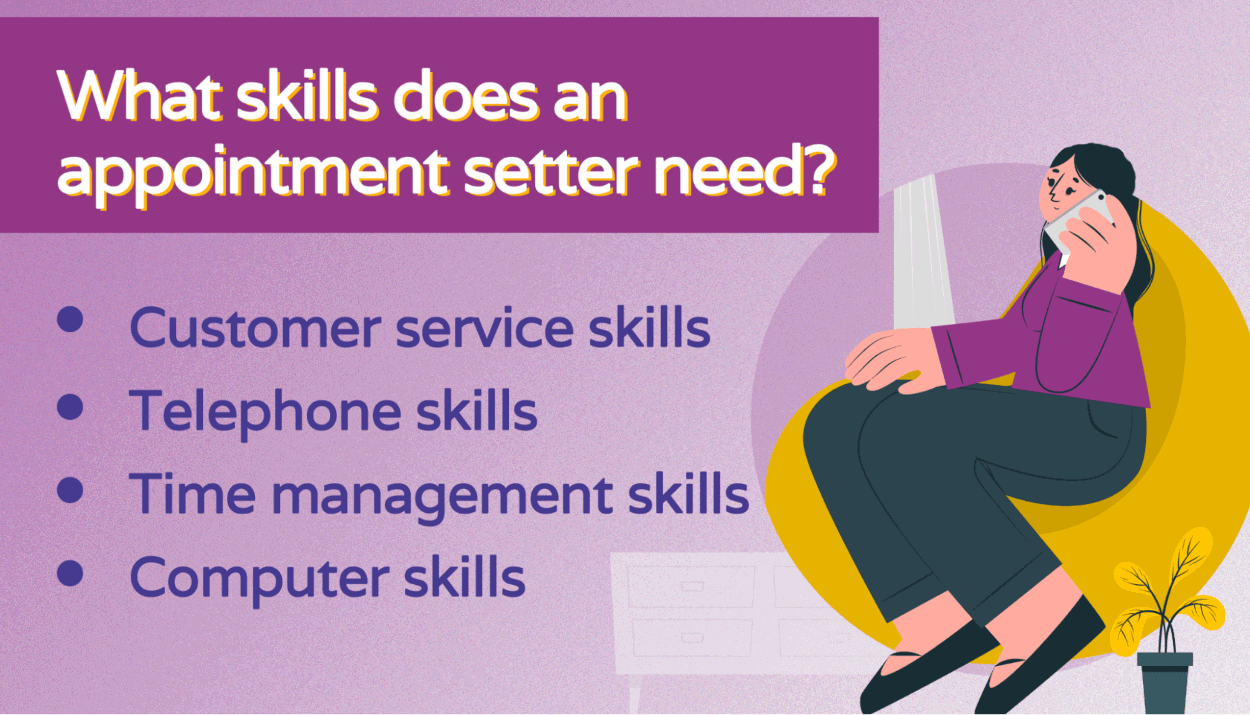
3. Technological savvy
Your clinic will probably use software for managing appointments. You need someone who is comfortable using technology with strong computer skills. Look for a person with fast, accurate typing speeds and experience using Microsoft Office and Google Workspace.
The virtual team at Hello Rache has all of these skills. Plus, our HVAs have medical knowledge and industry experience.
What does an appointment setter do in a healthcare setting?
Appointment schedulers can work in a range of industries. Let’s take a look at what they can do in a healthcare setting.
Remember, most of these tasks can be done remotely by an HVA, saving you time and money.
1. Answers phones
Appointment setters answer incoming calls. Patients may have basic questions, such as what appointment times are available and what the clinic hours are.
These team members use their outstanding listening skills to determine what the patient needs and when they are available. They'll confirm their details, including their name and phone number and try to fit new patient bookings in around existing appointments.
Sometimes, the job can involve forwarding telephone calls. If the patient wants to speak to the doctor, the appointment setter will see if they can take the call.
2. Books appointments
In most practices, patients can book appointments over the phone and online. There can also be walk-in appointments.
When you have multiple healthcare professionals, scheduling appointments can be a juggling act. Appointment setters use their organizational skills to make sure each physician's schedule runs smoothly.
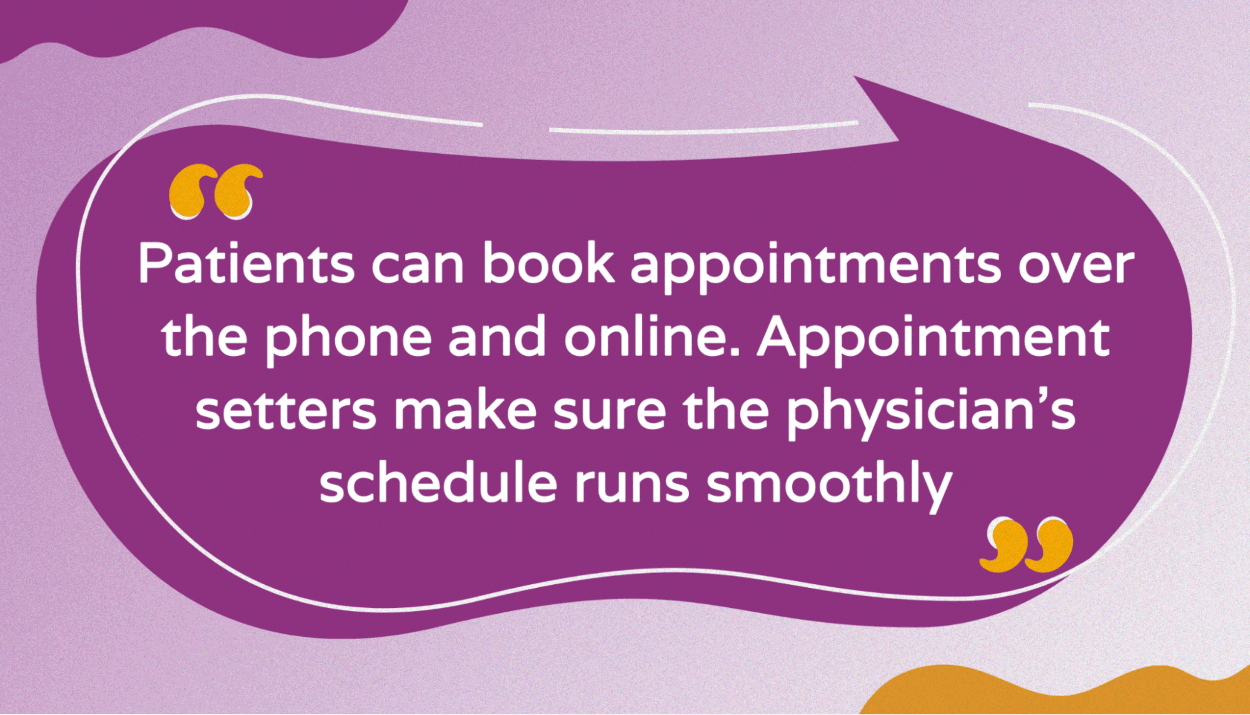
Some appointments can be made months in advance, and these motivated individuals need to schedule appointments in blocks. They make sure any vacations and other out-of-work commitments are marked as unavailable.
There are other types of appointments. For example, there can be sales appointments, and physicians may need to meet with other specialists. Health professionals may also have to travel for work.
3. Reschedules appointments
Things don't always go to plan, and sometimes appointments need to be rescheduled. For example, patients may cancel their appointments due to personal reasons. Or, a physician may be away sick.
Appointment setters reschedule any missed appointments. They'll usually confirm appointments the day before, either by phone or text. This process can help prevent no-shows on the day.
If there are appointment cancellations, there may be a waiting list. In this case, the appointment setter can offer the timeslot to someone else.
If a physician asks for an appointment to be canceled, the patient may be offered an alternative doctor. Alternatively, their appointment can be rescheduled as soon as possible.
4. Manages staff schedules
These healthcare workers need to manage a full calendar of appointments.
There can be multiple team members and commitments. For example, availability for appointments can vary between physicians. Some may only work part-time, while others may be happy to work late.
To be successful, appointment setters need extensive knowledge of staff schedules. They'll know the ins and outs of their day, week, and monthly availability. From time off to vacations, appointment setters will keep track of what's happening in the office.
Sometimes, these workers may be asked to organize meetings and work trips. For example, if a physician needs to attend a conference, they may book the accommodation and flights on their behalf.
5. Performs data entry
It's important that everyone who works at the practice is on the same page. Accurate data entry is essential, and this is one of the appointment setter duties.
When someone books a time, the appointment maker will input it into a computer program. You may already have dedicated software that you want them to use. This makes it easy for anyone on the team to check, change, and confirm appointments.
There are a few keys to getting data entry right. It should be accurate, relevant, consistent, and confidential.
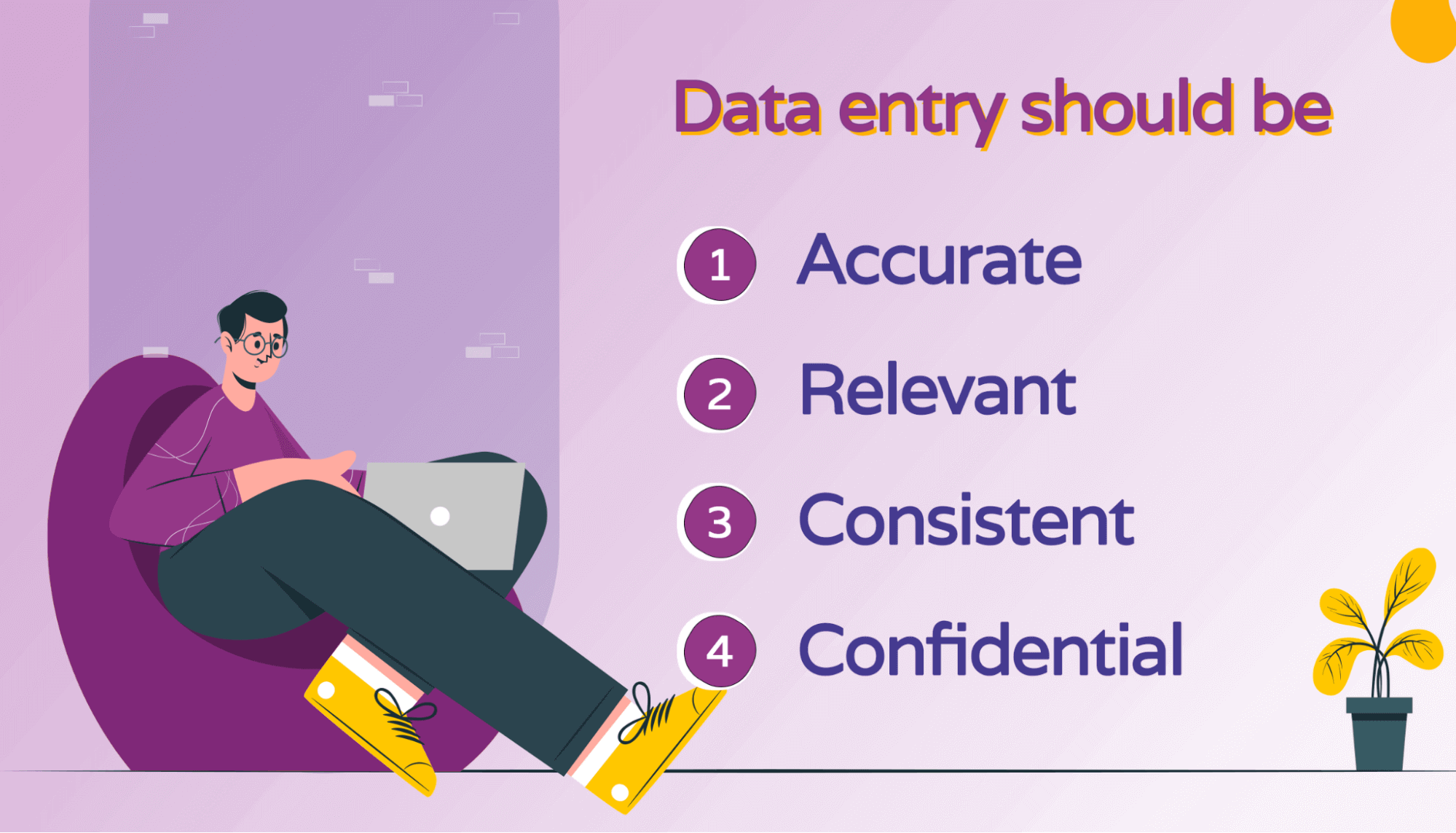
An experienced appointment setter will know how to store data correctly and comply with any patient privacy standards.
If you use a virtual assistant from Hello Rache, you can rest assured our team is HIPAA compliant.
6. Contacts specialists
Depending on the type of clinic you run, there may be times when you need to refer the patient to someone else. For example, they may be sent to have an x-ray or to visit another specialist.
If the patient doesn't feel comfortable organizing this, your appointment setter can do it for them.
They can call hospitals and specialists to see what appointment slots are available. The team member will use their relationship-building skills to network with other healthcare organizations.
Once they've made an appointment request, they'll confirm it with the patient. If there are any referral letters or information required, they'll send this to the specialist.
7. Updates patient files
When patients make a booking, the appointment setter will check their details. Each patient will have an electronic health record (EHR) that can be updated in real-time.
If it's a new patient, they'll need to create a file. For existing patients, they’ll ask them to confirm their name, phone number, and address.
Once the patient arrives, they may ask for additional details for the record, such as emergency contact details and underlying health conditions.
Appointment setters make sure the patient's health insurance details are up to date. If they don't have the right information, they'll call the health insurance company for verification.
How much does an appointment setter make?
If you're thinking of hiring an in-person appointment setter, your new team member will come at a cost. The rate can vary depending on your location and the person's skills, education, and experience.
The average salary for an appointment setter in the US is $14.54 an hour. The average annual salary is $38,172.
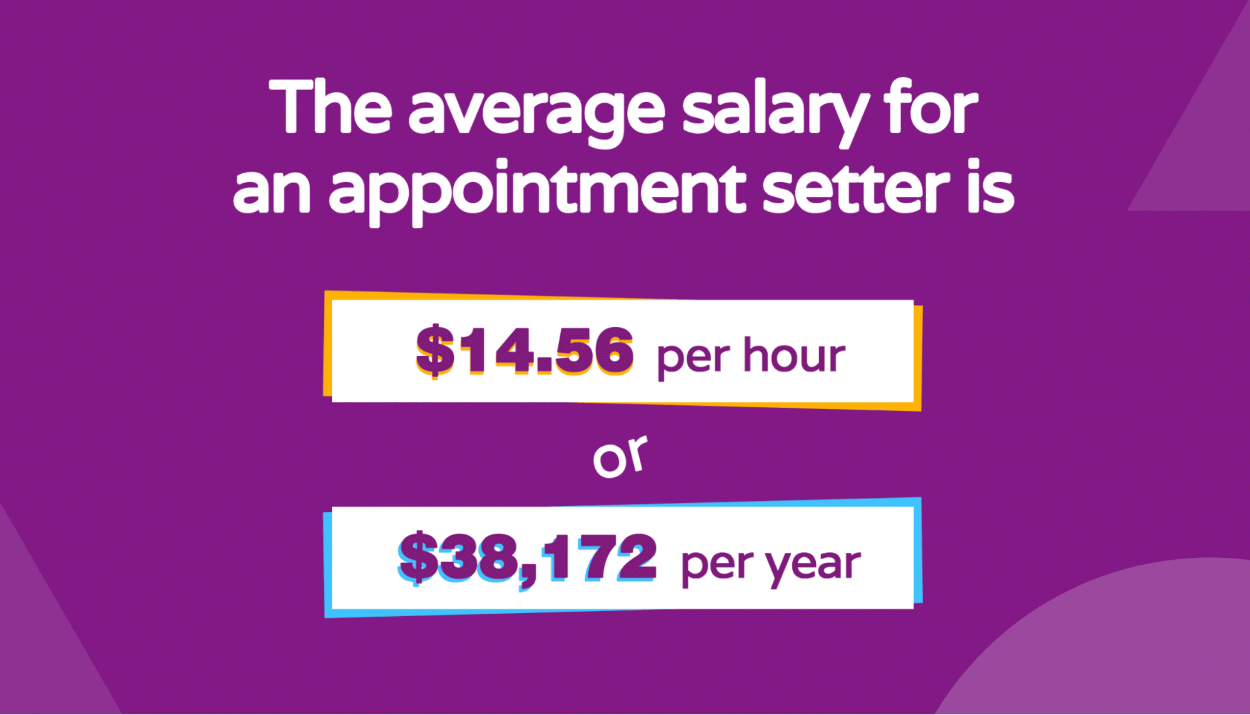
Those with the lowest salary make around $10.07, while appointment setters in the 90th percentile make $19.14 an hour.
Someone with one to four years of experience can earn an average of $13.75. Once they have five years of experience, the average goes up to $14.72. An appointment setter with over ten years of experience makes around $15.32 per hour.
It's an administrative position, and there's an affordable alternative. You can get assistance from a Healthcare Virtual Assistant (HVA) or virtual receptionist for just $9.50 per hour.
The Hello Rache team can take bookings, answer phones, and update patient files.
What are the top 3 benefits of a virtual assistant?
You don’t need an in-person appointment setter because a virtual assistant can do most of these tasks.
Here are the benefits of choosing a remote team member from Hello Rache:
More money in your bank account
A virtual assistant is an affordable option. You won’t need to find a dedicated office space, and you won't need to spend time training a new employee.
Our virtual assistants come at a fraction of the cost of an in-person appointment setter. It’s a flat rate, and you can use them as much or as little as you need.
You won’t have to pay overtime, and there’s no need to think about benefits. Plus, you can cancel at any time.
When you choose a virtual assistant from Hello Rache, your existing team can focus on providing patient care.
Better work-life balance
Healthcare practices can be busy work environments. Administrative staff can often feel overwhelmed, and physicians can be swamped with paperwork.
Having a remote assistant taking care of scheduling gives your team time to do other things.

We can reduce your workload by taking care of repetitive tasks. Besides answering the phone, our virtual assistants can do data entry, transcription, virtual scribing, and bookkeeping.
Your staff will have a better work-life balance, and they'll find it easier to manage their time. Less stress at work can improve retention rates and reduce burnout.
Our virtual assistants can fill in the gaps and collaborate seamlessly with your existing team.
Get a tech-savvy team
Depending on where you live, it can be difficult to find the right in-person employees. You need a tech-savvy team to take online appointments, update virtual files, and understand how to store patient data.
A virtual assistant has all of the skills you need. If you choose an HVA from Hello Rache, they'll have fast, accurate typing skills and medical knowledge. Our virtual assistants are confident in using health software and have all the tools required for the job.
For example, they have a quiet workspace, a computer, and a secure internet connection. They also come with HIPAA training, so they know how to handle sensitive patient information.
All you need to do is tell us what you need help with. You can leave the rest to our talented team members.
A day in the life of an appointment setter
Appointment setters work in a range of industries and are often found in healthcare environments.
The role is mostly administrative, and their main duty is scheduling appointments. They answer phones, reschedule missed or canceled appointments, and make sure the diary isn’t double booked.
Appointment setters manage staff schedules, perform data entry, and update patient files. They communicate with other services and contact specialists to arrange patient appointments.
If you need help in this area, a virtual assistant could be a good alternative. You can save money and give your team a better work-life balance. Plus, when you choose Hello Rache, you’ll get access to a tech-savvy team from anywhere in the world.
Are you ready to go digital and get efficient, cost-effective assistance? Get in touch to learn more about our virtual assistant services.

